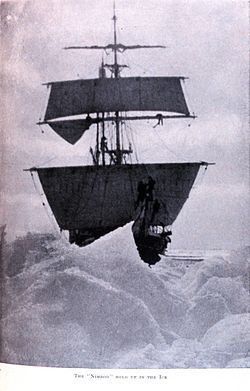Nimrod (ship)

Nimrod
|
|
| History | |
|---|---|
| Name: | Nimrod |
| Namesake: | Nimrod |
| Builder: | Stephen, Dundee |
| Yard number: | 36 |
| Completed: | January 1867 |
| Fate: | Sold 1909; wrecked 1919 |
| General characteristics | |
| Tonnage: | 334 GRT |
| Propulsion: | Sails, auxiliary steam engine |
| Sail plan: | Originally schooner, rebuilt as barquentine |
| Speed: | 6 knots (11 km/h) under steam |
Nimrod was the ship Ernest Shackleton used in his 1908 Antarctic Nimrod Expedition for the South Pole. It was a 41-year-old schooner of 334 gross register tons that had been used to hunt seals and whales. Shackleton, who paid £5,000 for the ship, had it re-rigged as a barquentine. It also had an auxiliary steam engine, but had a top speed of only six knots under this power. In addition, the ship was so overloaded with supplies for the expedition that it could not carry enough coal to make passage to the Antarctic from New Zealand, and Shackleton had to arrange for the ship to be towed to the edge of the pack ice by tramp steamer Koonya. The New Zealand government paid half the cost of the tow; Sir James Mills, Chairman of the Union Steamship Company, paid the other half. The Koonya was captained by Fredrick Pryce Evans during the tow.
Nimrod was initially captained by Rupert England, but Shackleton was dissatisfied with him and replaced him with Frederick Pryce Evans, who commanded the ship on the relief voyage in 1909. Nimrod was sold on Shackleton's return to Great Britain.
Nimrod's fate, 10 years after its return from the Antarctic, was to be battered to pieces in the North Sea, after running aground on the Barber Sands off the Norfolk coast on 31 January 1919. Only two of her 12-person crew survived.
A number of geographic features of Antarctica were named after the ship, including Nimrod Glacier.
...
Wikipedia
